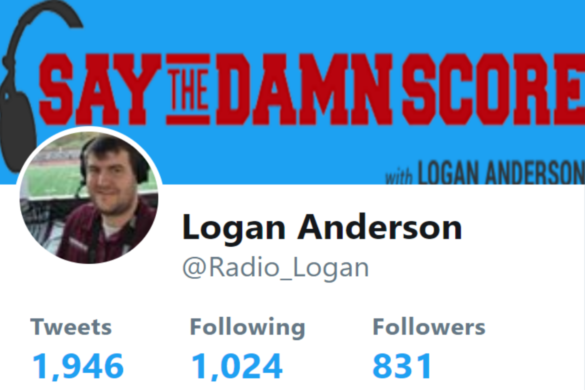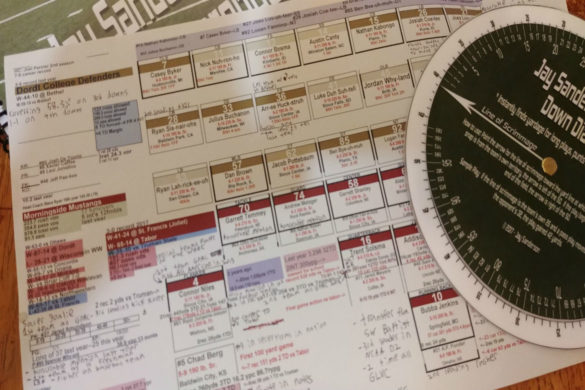I just completed my first week at ESPN Radio 1570 in Yankton, S.D. It’s been an adjustment, but an easy fit so far. First and foremost, my co-workers have been great and the station culture seems to be very laid-back. Secondly, the station owner Jeff is a former co-owner of KDSN in Denison, Iowa, where I worked my first job out of school. It helps that many of the programs and philosophies are exactly the same as they were in Denison. This means I haven’t had to start from square one and already have a level of familiarity with the way things operate.
My main task aside from prepping to broadcast high school football has been to travel with the salesperson I’m replacing and to meet my new clients. This got me thinking back to when I was first graduating from Morningside College and searching for my first sports job. I was hoping for a sports director job and expecting to settle for a sports job with an air shift, but the only offer that came through was sports and local sales.
College me was certain that I was taking the sales job as a temporary thing to get my foot in the door. My prodigious talent would land me a better sports job in no time and I would get out of sales quickly. Obviously, ‘College me’ had a few too many Busch Lights and I’ve continued down the sports/sales path for 8.5 years. My passion still lies in sportscasting but sales offers many opportunities that make it a fulfilling way to build a great sportscasting career. With this in mind I wanted to share some of the pros and cons of the sales/ sports combo.
Pros
Money– Anyone who’s been in local media for more than five minutes knows that the money is in the sales side. Doing news or an air shift, especially at the entry level, frequently means eating lots of ramen noodles and squeaking by on your bills. If you establish yourself and are successful on the sales side it can provide much more financial stability.
Full Time Work– I’ve listened to Jon Chelesnik from STAA talk about how he cleaned floors overnight in a Target store while he chased full time work in our business. Doing radio sales provides full time work, usually at the station you broadcast for. If for whatever reason you lose your play-by-play job like I recently did, you have a safety net that still allows you to work in radio while searching for something new.
Meeting Community Leaders– As sportscasters, we have to move to where the work is. Many times this means moving to unfamiliar places where you don’t know anyone. Part of sales is building relationships with clients who can become friends, direct you to clubs and social organizations, and in general help you to assimilate into your community. Many of these people have money and power with schools and semi-pro organizations that can influence your ability to advance in a particular market. Also, you can sometimes get better deals on purchases made through clients who have made money due to your ad campaigns.
Job Security– Rights move from station to station and formats change, but if you can bring in revenue, you will always have work.
Flexibility– If you are working a job outside of radio to support your play-by-play passion it can be hard to find times to pre-record coaches interviews, visit practice, and even to make the games. When you work in sales, it’s a lot of work, but you essentially make your own schedule. You can make time to do things that would be difficult many outside jobs or even an air shift.
Ability to Control Your Own Destiny– So much of sportscasting is outside of our control. It’s the most difficult part of the industry in my opinion. You need someone to subjectively like your work, have a situation where you fit in, and often requires being in the right place at the right time. Sales is a bottom line-driven skill. You either make money for the station or you don’t. The subjectivity is removed and success is in your hands.
Cons
Time Investment– I said earlier that being in sales gives you flexibility to work on your own schedule. Don’t confuse this with not having to put in long hours. Sales is a numbers game and making enough calls and building enough proposals is a grind. I do 90% of my chart building, research, and non-personal game prep at night after work. It’s not unusual for me to do sales work from 8am-6pm and then be up until after midnight prepping for a football game.
Inconsistent Income– On the flip side of controlling your destiny is not always knowing how much money you will make each month. It makes it difficult to budget and plan, especially when considering major purchases. I personally have had a difficult time getting financing because any projection for what I might make in the next few months is total speculation.
Pigeonholing– When you’re in sales and play-by-play it’s a challenge to develop other areas of your resume. For example, I’ve missed out on jobs because I don’t get experience doing sports updates, news, or production. Even if you ask to help out with other things at your station often management considers your time more valuable when you’re on the street and discourage spending time in other areas of the business.
Pressure– If you have a bad game or a bad air shift you shake it off and come back the next day. If you have a bad sales day you don’t make any money and management doesn’t see any revenue coming in. Everyone at the station depends on you to pay their salaries. This can be a heavy burden to bear.
Rejection– If you close 20% of your proposals, you are doing well in sales. Business owners frequently treat radio sales people like they have a deadly infectious disease when they walk in the door. After all, their goal is to make money and our goal is to get them to spend it on a non-tangible product. If you can’t take rejection or having to fight through unfair animosity sales is not the job for you.











